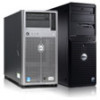Dell PowerEdge T610 Hardware Owner's Manual - Page 177
Using the Custom Test Options, Selecting Devices for Testing, Selecting Diagnostics Options
 |
View all Dell PowerEdge T610 manuals
Add to My Manuals
Save this manual to your list of manuals |
Page 177 highlights
Testing Option Express Test Extended Test Custom Test Information Function Performs a quick check of the system. This option runs device tests that do not require user interaction. Performs a more thorough check of the system. This test can take an hour or longer. Tests a particular device. Displays test results. Using the Custom Test Options When you select Custom Test in the Main Menu window, the Customize window allows you to select the device(s) to be tested, select specific options for testing, and view the test results. Selecting Devices for Testing The left side of the Customize window lists devices that can be tested. Click the (+) next to a device or module to view its components. Click (+) on any component to view the tests that are available. Clicking a device, rather than its components, selects all of the components of the device for testing. If an item is grayed-out and you wish to run that test, you can select it by highlighting the item and pressing the spacebar. NOTE: After you select all the devices and components that you want to test, highlight All Devices and then click Run Tests. Selecting Diagnostics Options From the Diagnostics Options area, select the test(s) you want to run on a device. • Non-Interactive Tests Only - Runs only tests that require no user intervention. • Quick Tests Only - Runs only the quick tests on the device. • Show Ending Timestamp - Time stamps the test log. • Test Iterations - Selects the number of times the test is run. • Continue on Failure - Enables the tests to continue without user intervention in the event that one of the tests has failed. Running the System Diagnostics 177















